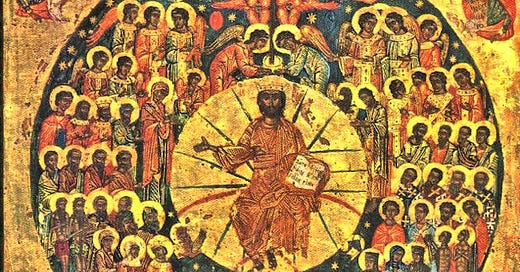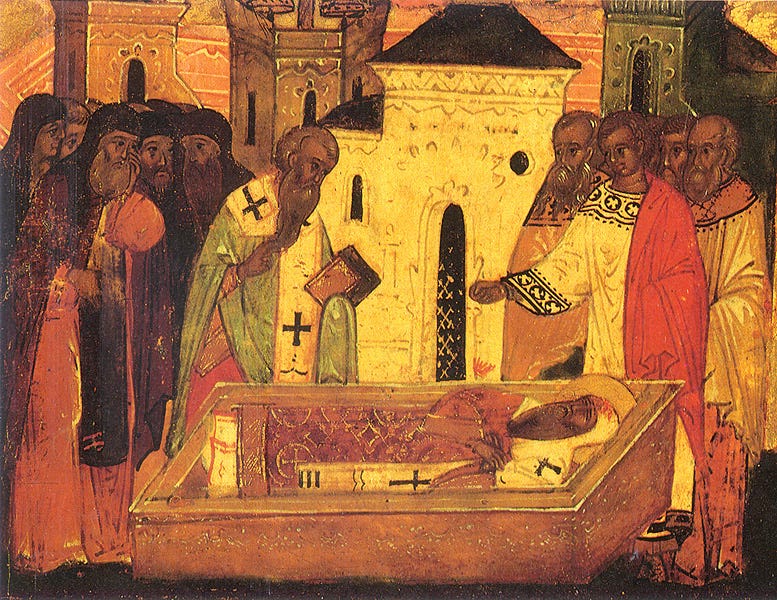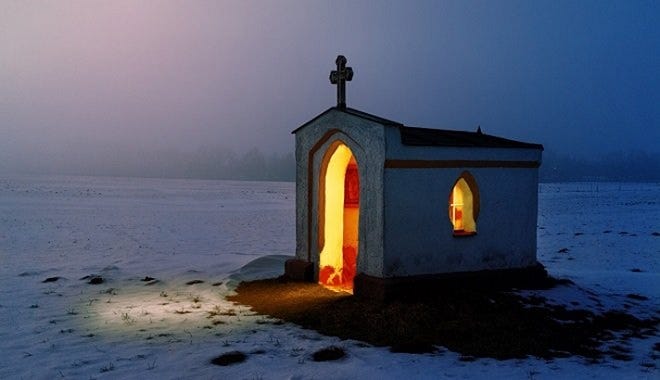“The saints must be honored as friends of Christ and children and heirs of God. Let us carefully observe the manner of life of all the apostles, martyrs, ascetics, and just men who announced the coming of the Lord. And let us emulate their faith, charity, hope, zeal, life, patience under suffering, and perseverance unto death so that we may also share their crowns of glory.”
St. John of Damascus
Acts 12:25-13:12
In those days, Barnabas and Saul returned from Jerusalem when they had fulfilled their mission, bringing with them John whose other name was Mark. Now in the Church at Antioch there were prophets and teachers, Barnabas, Simeon who was called Niger, Lucius of Cyrene, Manaen a member of the court of Herod the tetrarch, and Saul. While they were worshipping the Lord and fasting, the Holy Spirit said, “Set apart for me Barnabas and Saul for the work to which I have called them.” Then after fasting and praying they laid their hands on them and sent them off. So, being sent out by the Holy Spirit, they went down to Seleucia; and from there they sailed to Cyprus. When they arrived at Salamis, they proclaimed the word of God in the synagogues of the Jews. And they had John to assist them. When they had gone through the whole island as far as Paphos, they came upon a certain magician, a Jewish false prophet, named Bar-Jesus. He was with the proconsul, Sergius Paulus, a man of intelligence, who summoned Barnabas and Saul and sought to hear the word of God. But Elymas the magician (for that is the meaning of his name) withstood them, seeking to turn away the proconsul from the faith. But Saul, who is also called Paul, filled with the Holy Spirit, looked intently at him and said, “You son of the devil, you enemy of all righteousness, full of all deceit and villainy, will you not stop making crooked the straight paths of the Lord? And now, behold, the hand of the Lord is upon you, and you shall be blind and unable to see the sun for a time.” Immediately mist and darkness fell upon him and he went about seeking people to lead him by the hand. Then the proconsul believed, when he saw what had occurred, for he was astonished at the teaching of the Lord.
John 8:51-59
The Lord said to the Jews who came to him, “Truly, truly, I say to you, if any one keeps my word, he will never see death.” The Jews said to him, “Now we know that you have a demon. Abraham died, as did the prophets; and you say, ‘If any one keeps my word, he will never taste death.’ Are you greater than our father Abraham, who died? And the prophets died! Who do you claim to be?” Jesus answered, “If I glorify myself, my glory is nothing; it is my Father who glorifies me, of whom you say that he is your God. But you have not known him; I know him. If I said, I do not know him, I should be a liar like you; but I do know him and I keep his word. Your father Abraham rejoiced that he was to see my day; and he saw it and was glad.” The Jews then said to him, “You are not yet fifty years old, and have you seen Abraham?” Jesus said to them, “Truly, truly, I say to you, before Abraham was, I am.” So they took up stones to throw at him; but Jesus hid himself, and went out of the temple.
Uncovering of the relics of Saint Alexis, Metropolitan of Moscow and Wonderworker of All Russia
The Uncovering of the Relics of Saint Alexis, Metropolitan of Moscow and All Rus. Before his blessed repose in 1378 Saint Alexis, Metropolitan of Moscow, left instructions to place his body in the Chudov (Miracle of the Archangel Michael) monastery in the Kremlin. He designated a burial place outside the altar of the church, since in his humility he did not want to be buried in the temple. But the pious Great Prince Demetrius Ivanovich Donskoy (1363-1389), greatly esteeming the holy hierarch, gave orders to place the body of Metropolitan Alexis inside the church, near the altar.
On May 20, 1431 the stairway of the temple where the saint rested crumbled from old age. During the construction of a new temple, the incorrupt relics of Saint Alexis were uncovered. At a Council of Russian hierarchs the commemoration of Metropolitan Alexis was established on the day of his repose, February 12, and on the day of the uncovering of his relics, May 20. He is also commemorated on October 5.
In 1485, the relics of the saint were transferred into a church dedicated to him. At present, they rest at the Patriarchal Theophany cathedral in Moscow. The Life of Saint Alexis is found under February 12.
The everyday miracles we don’t notice
Protopresbyter Georgios Dorbarakis
Saint Sophrony in Essex said that we still have not a few ascetics (whom the Lord has hidden) who don’t perform obvious miracles, though great miracles occur every day in their souls, unobserved by most people. One such miracle is when the soul leans towards pride, it falls into darkness and sloth. But if it’s humbled, then joy, compunction and light come to it. [in Saint Silouan the Athonite]
When they hear of a living saint who works wonders, particularly the healing of spiritual or bodily ailments, most Christians try their absolute best to visit him or her, if possible, to get their blessing, to tell them their problems, and be healed and have their health restored. And this is profoundly human, because no-one wishes to suffer and be tormented in a world which, in any case, offers mostly pain and hardship, because of our fall into sin. And this haste to seek out a saint also happens, of course, after the saint has departed this world. There are still his or her relics, there’s perhaps a wonder-working icon, there’s the grave, and there are various items which have been sanctified by their touch. People in pain must, however, be guarded when having recourse to someone and be sure that these persons do indeed bear the marks of sanctity as described by the Church from its inception by Christ and thereafter. Because the wicked devil is always at work in the world. Saint Paul says the evil one can transform himself into ‘an angel of light’ in order to lead us astray. The important thing is that many people seek out a wonder-working saint because they realize, quite rightly, that God’s grace is particularly present in that person, since it’s God who makes people his saints and gives them talents which they can then use for the good of others: ‘freely you have received; freely give’. Let’s not forget that most often God acts in the world through his people, as was the case even with his incarnation: he became human in order to save us humans.
Saint Silouan notes, however, that there’s another dimension to miracles which, although it exists and, in fact, occurs daily, goes unnoticed by most people. These aren’t the obvious miracles of well-known saints but those wonderful events which happen daily in the souls of unobtrusive saints. Saint Silouan allows us to conclude that these miracles aren’t less great or effective than the ones we consider major wonders. The great Saint Silouan’s contribution on this subject is that, by the grace which God gave him, he guides us so that we can open our eyes to the hidden reality, which is the true and profound actuality of our world. Isn’t this what Saint Paul means when he urges us to concentrate not on what’s perceptible to the bodily senses- the ‘seen’- but on the ‘unseen’ in the depths of our world, which is the action of God’s grace and is that which maintains the universe and is eternal? ‘We look not at what can be seen but at what cannot be seen; for what can be seen is temporary, but what cannot be seen is eternal’ [2 Cor. 4, 18]. This, of course, is because God has given us the grace to ‘walk by faith’, not only by the senses. It’s faith, the eye of the soul, which enables us to perceive the supra-sensual realities that are many times more authentic. Unbelievers aren’t able to see these depths, because they act as if they’re blind. As, indeed, they are, because their eyes are ruined by their wickedness and are still enveloped in the murk of their passions.
What are these wonderful things experienced by saints who are unobtrusive because God chooses not to reveal them? Saint Silouan is our comforting guide: they’re all the things which are in the nature of miracles and which are experienced by all true believers in the Lord who strive to observe his holy commandments. If you lean towards pride, he says, you’ll realize your departure from path of the Lord from the negative symptoms you suffer: ‘darkness and sloth’. But if you begin the struggle for humility, then ‘joy, compunction and light’ will come, which are signs of God’s presence. And what else can you call the perceptible presence of God’s grace other than a miracle? So, according to Saint Silouan, it’s not just various ascetics, unobtrusive saints, who experience his presence by a miracle, but all the Christians in the world, provided they keep God’s commandments before them and ask him for the strength to observe them. They don’t look for miracles in others. They experience them themselves, where they are, in their own existence, in their body and soul. This being so, they, too, see God directly, in the sense that they have personal experience of God, who knows no greater joy than to ‘share’ himself and to dwell in those who want him in their life. In the end, it’s not only Saint Silouan who stresses this truth. All our holy Fathers tell us about the power of faith in us when we set it to work by our well-intentioned will. Saint Isaak the Syrian, for example, believes that no matter what the state we find ourselves in, even the darkest, we can see in ourselves the miracle of resurrection, what he calls ‘the resurrection from the dead’, provided we wake up and want to align our lives with what the Lord has ordained. And, in essence, it’s certainly what the Lord reveals in his parable of the prodigal: ‘My son was lost and has been found; he was dead and lives again’. Precisely because he found the way back to God, that is, he repented. So repentance is the greatest miracle and can be experienced by each and every person in the world.
This week’s calendar reminders:
Monday 5/19: Matins 8:30 a.m.
Tuesday 5/20: no services or events
Wednesday 5/21: no services or events
Thursday 5/22: Matins 8:30 a.m.; Men’s Group 7 p.m.
Friday 5/23: Matins 8:30 a.m.
Saturday 5/24: Catechumen Class 4:30 p.m.; 40-Day Memorial for Evangeline 5:30 p.m.; Great Vespers 6 p.m.
Sunday 5/25: Divine Liturgy 9:15 a.m.
CLICK BELOW to donate online:
Christ the Savior Orthodox Church is located in Southbury, Connecticut, and is part of the New England Diocese of the Orthodox Church of America.
Mailing address: Christ the Savior Church, 1070 Roxbury Road, Southbury, CT 06488
PLEASE DONATE to help our parish do the work of the Lord, thrive and grow, and extend the Kingdom of God. May the Lord bless your generosity!
Fr. Moses Locke can be reached at frmoseslocke@gmail.com











